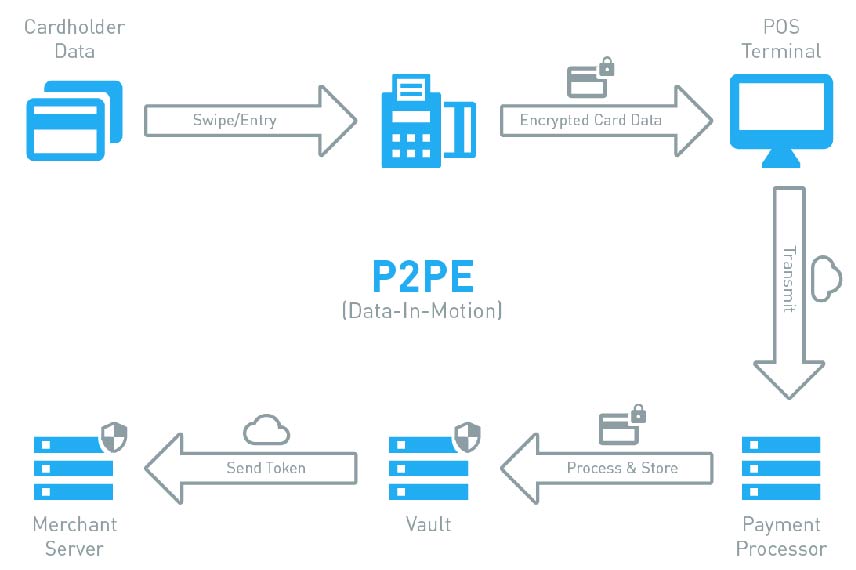DATA SECURITY & COMPLIANCE | 10 MIN READ
What is P2PE?
How Point-To-Point Encryption Solves PCI-Compliance Concerns


What is Point-To-Point Encryption?
Each device is individually injected with an encryption key unique to the merchant. This carefully-controlled process takes place off-site at an approved Hardware Security Module (HSM). Once completed, these PCI-certified devices are then securely shipped to the merchant.
What’s the benefit of using a P2PE device?
Once card data is keyed into a merchant’s computer, the company’s whole network becomes “in scope” for PCI auditing and compliance standards. As PCI compliance guidelines and requirements become more complex and costly, P2PE devices offer a quick and relatively inexpensive solution.
P2PE solves PCI compliance issues because cardholder data is keyed directly into the device, where it’s encryped before ever hitting the merchant’s computer, network, or servers.
“Our solution prevents clear-text cardholder data from ever being present in our clients’ network. That means their customer’s credit card data isn’t accessible in the event of a data breach. This also removes our clients computers and servers out of scope for PCI compliance.
Jeff Mains
CEO, Intelligent Contacts
Our PCI-Certified P2PE devices undergo the most extensive security measures?
Once the unique encryption key has been injected, our certified devicesare designed to detect tampering. If malicious activity is detected, the device is automatically deactivated, preventing a breach.
“While there are other providers offering solutions as “end-to-end encryption solutions,” most are non-validated P2PE products. Only P2PE solutions listed on the PCI-SS website have been audited and approved by the Payment Card Industry Council.”
Jeff Mains
CEO, Intelligent Contacts

How our P2PE solutions reduce PCI compliance requirements
Our PCI-approved P2PE devices are fully-integrated with our merchant gateway and virtual terminal. All transactions can be managed and reconciled in one place, or sent to your system of record (collection software, EHR, CRM) through our Rest API or sFTP.
Looking to solve yearly PCI compliance headaches with one call! We can help!
Resources
More Articles Related Consumer Payments
Why Siloed Systems Are Costing You: The Case for Platform Consolidation
Discover how siloed communication and payment platforms can lead to inefficiencies, missed revenue, and compliance issues. This article explains why modern agencies need to consolidate operations and manage the entire consumer journey within one unified platform. Intelligent Contacts’ integrated solution combines a Hosted Contact Center and a self-service payment portal to streamline operations, maintain compliance, and improve ROI. Learn how to stay ahead in 2025 by embracing an integrated, consumer-centric approach to communication and collections.”
What the ARM Industry Needs to Know as Federal Student Loan Collections Resume
After a multi-year pause initiated during the COVID-19 pandemic, the U.S. Department of Education has confirmed that collections on defaulted federal student loans will resume on May 5, 2025. This shift carries significant implications for the ARM industry — especially those engaged in debt recovery for educational and government portfolios. With nearly 10 million borrowers expected to be in default and only 38% of borrowers currently in active repayment, the market is poised for a large-scale operational resurgence.
CFPB Revokes Controversial Medical Debt Advisory Opinion in Response to Industry Pushback
In a major win for the accounts receivable and collections industry, the Consumer Financial Protection Bureau (CFPB) announced that it will revoke its controversial advisory opinion on medical debt collection, originally slated to go into effect in January 2025. The decision comes after significant legal challenges and lobbying efforts led by ACA International and other stakeholders.



